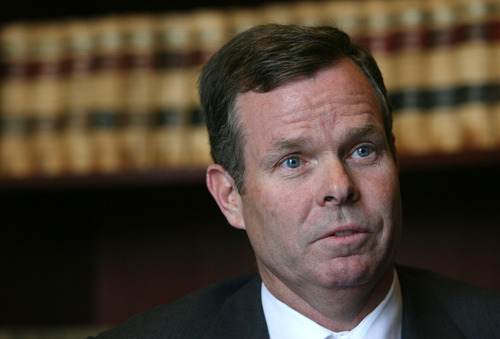This is an archived article that was published on sltrib.com in 2013, and information in the article may be outdated. It is provided only for personal research purposes and may not be reprinted.
Nephi • Utah Republicans grappled with how to respond to a scandal affecting Attorney General John Swallow, opting Saturday not to formally address lingering claims of ethical misconduct, even though some felt it was time for the GOP to act.
"I think it's one of the most important issues facing our party right now," said Aaron Gabrielson, chairman of the Wasatch County Republican Party. "Everyone is looking at us … for our response, and by saying nothing we are also sending a message."
Members of the GOP State Central Committee — the state party's governing body — voted by a 2-1 margin not to hold a formal discussion about the Swallow matter during Saturday's quarterly meeting.
Swallow is the subject of an ongoing federal investigation into help he offered indicted businessman Jeremy Johnson and other fundraising issues.
One of those who opposed the party taking any action was Sean Reyes, who lost a Republican primary to Swallow in June.
"I think people are rushing to judgment," Reyes said. "John ought to be given time to make his case, and we are a party of due process."
Reyes said that, as an attorney, he believes in presenting all the facts and evidence and then making a judgment.
Gabrielson said he was disappointed the party didn't at least discuss Swallow's situation. He believes the inaction sends the wrong message to voters.
"I'd like to send a message that the Republican Party doesn't cover for its own. That we police our own, and if someone doesn't live up to those standards, we ask them to leave," said Gabrielson, who said he voted for Swallow before he learned of the allegations against him.
"A lot of people feel like he's let us down," he said.
The Central Committee's decision to not formally discuss Swallow's situation did not prevent Republican Party Chairman Thomas Wright from using his position to address the allegations against Swallow and reiterate his call for ethics reform.
Wright said the courts can decide the question of whether Swallow's behavior was legal, but it is appropriate for the Republican Party to focus on whether the behavior was ethical and to take the lead on ethics reform.
"When you get elected to a public office, you're held to a higher standard," Wright said. "If there were some things that happened, then we need to fight for ethics reform and make sure they're not legal in the future."
Swallow has been dogged by allegations made by indicted businessman Jeremy Johnson, who sought help from him in 2010 — when he was chief deputy attorney general — with a Federal Trade Commission investigation into Johnson's I Works business.
Swallow says he connected Johnson with a former employer — late Check City founder Richard Rawle — who Johnson paid $250,000 to hire lobbyists. Johnson has said the money was meant to enlist involvement from Senate Majority Leader Harry Reid, D-Nev., a payment Johnson has called a bribe.
Reid denies any knowledge of Johnson's case, and Swallow has denied the bribery charge.
Swallow also used Johnson's massive Lake Powell houseboat. In addition, he did consulting work for Rawle on a Nevada cement project. Rawle originally used Johnson's money to pay Swallow for his work, but Swallow did not disclose the payment or his or his wife's roles in the company on his financial disclosure forms.
Wright has previously called for disclosure of all public officials' meetings, campaign contribution limits, a gift ban and an ethics commission for executive-branch officials.
Ethics reform, Wright said, is good for the system and good for elected officials. It would let an elected official look at Johnson and say he can't meet him at Krispy Kreme — the location of one meeting between Swallow and Johnson — because he can't have private meetings or that he can't use Johnson's houseboat.
"It doesn't give any of us any pleasure to see this happen to our friend, to someone we campaigned for," Wright said, but the party has an obligation to deal with the issue directly and aggressively.



